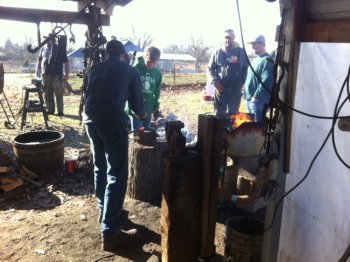Self Made Knives
Well-Known Member
A couple weeks ago I went as a visitor to the local chapter meeting of the Arkansas Blacksmith Organization. There were about a dozen guys there, but only one that forged knives. I tried to feel him out, but he pretty much makes rustic style $50 knives, mostly as trade items. Not really my thing as far as knives go, but it did seem like a good group of guys.
So, my question is how many of you guys use a coal forge? Seems like just about everything I see online are propane/gas forges. If I join the club, they buy coal in bulk so you can get it pretty cheap. Would there be any big disadvantages to using coal? A coal forge seems easy enough to build.
So, my question is how many of you guys use a coal forge? Seems like just about everything I see online are propane/gas forges. If I join the club, they buy coal in bulk so you can get it pretty cheap. Would there be any big disadvantages to using coal? A coal forge seems easy enough to build.

